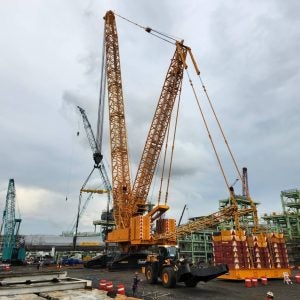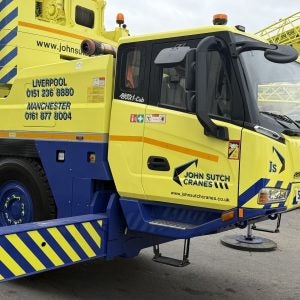Conexpo 2002 opened last month with the big news that Manitowoc Company Inc is to buy Grove Worldwide for $270m.
The deal was agreed at 3.20pm on Monday 18 March and confirmed by Manitowoc CEO Terry Growcock at a Manitowoc customer dinner that evening at the Bellagio Hotel in Las Vegas, USA. The takeover immediately became the main crane industry talking point at the Conexpo show which opened the following day.
‘We are truly excited by this opportunity,’ Growcock said.
The price includes $40m to $50m of goodwill, said Manitowoc chief financial officer Glen Tellock. With Grove having $200m of debt, this implies a book value for Grove of $20m to $30m.
The takeover is subject to regulatory approval and was expected to take 45 to 90 days to close, Growcock said. This means that by June Grove Crane will be a subsidiary of the Manitowoc Crane Group.
The big regulatory issue is whether the USA’s Federal Trade Commission will sanction Manitowoc’s acquisition of Grove’s National Crane division, or whether it will be deemed that the two companies would together have too great a share of the North American boom truck market. A swift sale of National – and there would be no shortage of bidders for what is the clear market leader in its segment – would help Manitowoc’s balance sheet by raising as much as $60m or $70m and prevent protracted negotiations and escalating legal fees in the face of strong objections from Terex. It was the fierce competition of Terex, after all, that had done most to bring Grove to the brink of bankruptcy.
Other talking points at Conexpo were branding and the likely management structure. The Grove identity is to be maintained, at least for the time being. As for the management structure, it took three to six months before Potain was integrated, so it may be the end of the year before the shape of the enlarged Manitowoc Crane Group is evident. Some wondered whether Grove CEO Jeff Bust, who previously headed Manitowoc Cranes, would win overall charge of the Manitowoc Crane Group operation as the most experienced manager in the group. The Manitowoc management team has more enthusiasm than experience. Grove, on the other hand, has a broad range of managers with many years of service and a deep knowledge of the industry and its people. One of the challenges for Manitowoc is to leverage these talents rather than alienate them.
Under the takeover deal, the banks and institutions that took ownership of Grove when it came out of Chapter 11 bankruptcy protection in September 2001 will now be given $70m of Manitowoc stock in exchange. Collectively their shareholding will amount to about 7% of Manitowoc Company Inc. Holders of Grove’s $200m debt will be paid off under a financing facility provided to Manitowoc by Deutsche Bank Alex. Brown which advised it in the transaction. At a likely interest rate of 8%, this will cost Manitowoc an extra $16m a year, but it expects $40m of cashflow from Grove.
Having paid $300m for French tower crane manufacturer Potain just last year Manitowoc will have debts of about $650m on closure of the Grove deal.
The combination of Manitowoc (crawlers, boom trucks), Potain (top slewing and self-erecting tower cranes, Liftlux scissor lifts) and Grove (telescopic rough terrains, all terrains, truck cranes and aerial work platforms) makes a comprehensive product range rivalled only by Terex. On takeover, the group will have a range of 1,000 models, Growcock said. It will also have 5,000 employees worldwide, although a headcount reduction at Grove must be expected, even though it has already cut its numbers significantly since the mid 1990s when it was owned by Hanson.
Another strength of the deal is the overlap in the US distribution networks between Manitowoc and Grove. Southeastern (Ringhaver), Shawmutt, Head & Engquist, ICM/ACM, Hayden-Murphy Equipment and Coast Crane – which together account for about two thirds of Grove crane sales – are all distributors for Manitowoc as well as Grove.
They also share distribution outside of North America, for example in Asia, where Manitowoc is itself the Grove distributor since assimilating Coastal Equipment last year. And in Germany Stirnimann AG is a distributor for both Potain and Grove.
For Grove, the takeover came just in time as it was still fighting off bankruptcy, in spite of having restructured its balance sheet last year to shake off most of its debt.
A one-off charge of $14.5m and a 25% drop in sales revenue led to Grove making an operating loss of $12.4m in the first quarter of fiscal 2002.
The benefit of the balance sheet restructuring was clearly shown, however. Over the three month period, ending on 29 December 2001, interest repayments on debt came to just $2.9m, compared with $18.1m for the same period in the previous year.
Net sales, however, decreased nearly 25% to $130.8m for the first quarter from $173.4 million for the first quarter of fiscal 2001.
Adjusted for a one-off charge of $14.5m relating in part to the company coming out of Chapter 11, gross profit decreased 15% to $20.6. The write-off turned an operating loss of $606,000 in the first quarter of the previous financial year into an operating loss of $12.4m this time.
Earnings before interest, taxes, depreciation and amortisation (EBITDA) was $5.5m for the three months, down 9% on the previous year’s first quarter figure of $6.1m.
Thanks mainly to the 220 job cuts in the first quarter of fiscal 2001, overheads this time around (selling, engineering, general and administrative – or SG&A – expenses) fell 15.1% to $18.5m. However, as a percentage of net sales SG&A was 14.1% in the first quarter of fiscal 2002 compared with a more efficient 12.6% in the first quarter of fiscal 2001.






